What is a LIMS?
Discover what is a LIMS, its purpose, and its key benefits. Learn how a LIMS automates workflows and enhances lab efficiency, data integrity, and compliance.
Discover what is a LIMS, its purpose, and its key benefits. Learn how a LIMS automates workflows and enhances lab efficiency, data integrity, and compliance.
Home › What is a LIMS?
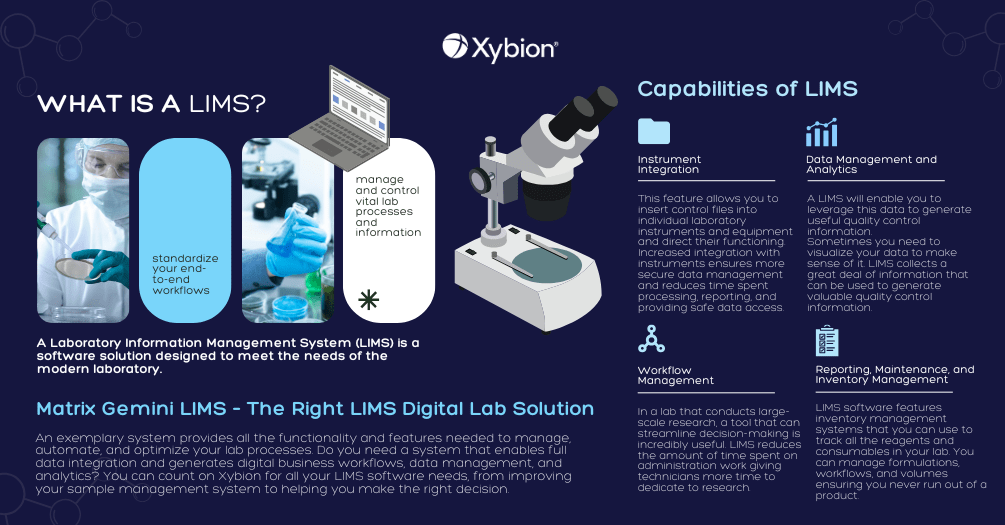
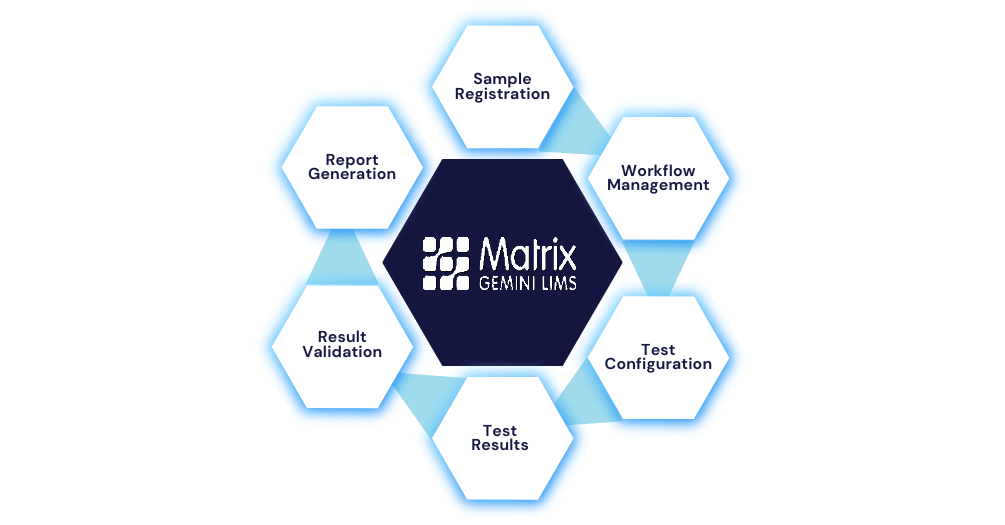
A Laboratory Information Management System (LIMS) is a vital software solution that enhances the efficiency and organization of modern laboratories. At its core, a LIMS organizes and manages laboratory data, ensuring compliance with regulations and improving the quality of workflows. By capturing, storing, managing, and analyzing data, a LIMS supports key laboratory functions such as quality control, project management, and regulatory compliance. This blog will explore the various aspects of LIMS and its importance in laboratory operations.
LIMS serves as an integrated tool for laboratory automation, replacing outdated manual systems with a digital platform that enhances efficiency. It automates the management of samples throughout their life cycle, ensures the integrity and security of data, and reduces time usage in manual entry of data. It enables laboratory personnel to focus on critical analytical tasks and thus enhances general productivity.
The core of managing and automating all the activities in the laboratory, such as the processing of data, is done by a LIMS. It will provide sample tracking, test management, and integration of diverse laboratory activities. This makes sure that every stage of laboratory testing is documented with precision and can be easily accessed. A LIMS will enhance the accuracy and further productivity of the laboratory functions due to easy information flow and reduction of manual entry.

A Laboratory Information Management System (LIMS) serves multiple critical purposes, each aimed at streamlining and optimizing laboratory operations. At its core, a LIMS is designed to enhance efficiency, accuracy, and compliance in highly regulated industries such as clinical research, pharmaceutical development, biobanking, and more. Here are the key functions a LIMS fulfills:

A LIMS tracks samples throughout their entire life cycle, from collection to disposal, minimizing the risk of human error and ensuring data integrity.

It keeps track of reagents, consumables, and other laboratory supplies, ensuring that lab processes continue smoothly without interruptions due to shortages.

The system generates on-demand reports that support decision-making and ensure compliance with regulatory standards like ISO 17025 and full 21 CFR Part 11 compliance, enhancing transparency and accountability.

A LIMS schedules and manages tests to maximize efficiency and ensure the accuracy of results, streamlining laboratory workflows.
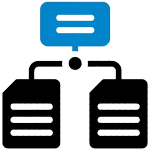
It stores and organizes all relevant documents in a centralized, easily accessible location, facilitating regulatory compliance and audit readiness.
These functionalities demonstrate the value of LIMS in reducing human error, managing large volumes of data, and supporting complex laboratory operations. For example, Matrix Gemini LIMS exemplifies these capabilities, with a focus on adaptability to various laboratory environments, including clinical laboratories and research settings.
In practice, a LIMS automates data management across all aspects of laboratory operations, from sample tracking to result analysis. This reduces the potential for errors and ensures that laboratories maintain high standards of accuracy and productivity. By integrating data from different systems, a LIMS enables real-time decision-making and enhances overall laboratory efficiency.
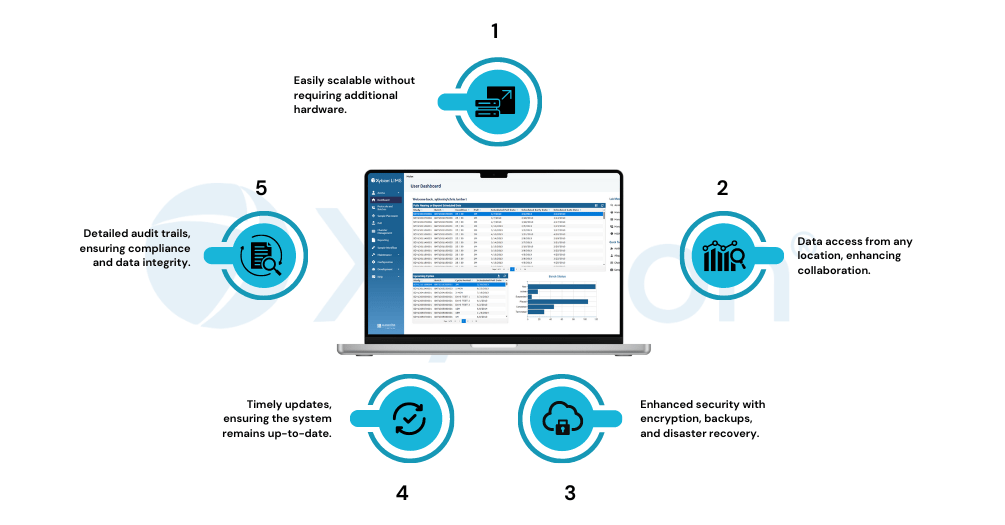
The key features of a Laboratory Information Management System (LIMS) are designed to meet the diverse and complex needs of modern laboratories. These features not only streamline laboratory workflows but also ensure the integrity, traceability, and compliance of laboratory processes. Here are some of the core features:
A comprehensive LIMS supports a wide range of laboratory operations, from research to routine analytical testing. Its ability to manage the chain of custody for samples, combined with robust data management and automation capabilities, makes it an indispensable tool for ensuring the accuracy, reliability, and efficiency of laboratory processes.
Implementing a Laboratory Information Management System (LIMS) in a laboratory setting offers a multitude of benefits that extend far beyond mere data management, significantly enhancing various aspects of laboratory operations. One of the most notable advantages is the improvement in data integrity and regulatory compliance, both of which are critical in today’s highly regulated environments. A LIMS automates and streamlines workflow processes for better efficiency in data entry and resource management, which in turn helps increase the accuracy and reliability of laboratory results, not to mention overall operational efficiency.
The transition from manual processes to a LIMS-driven automated system dramatically reduces the likelihood of human error, which is crucial for maintaining the integrity of scientific studies or projects where data accuracy is paramount. Additionally, LIMS systems can effectively manage the increasing complexity associated with handling large volumes of samples, a common challenge in advanced laboratory operations. This capability is particularly beneficial in high-throughput environments where the demand for rapid and accurate data processing is critical.
One of the key features of a LIMS is its ability to integrate seamlessly with laboratory instrumentation, allowing for direct data capture and real-time analysis. Moreover, a LIMS significantly improves the management of research studies by facilitating the organization and analysis of data, particularly when dealing with complex datasets. By grouping samples into cohorts and automating data workflows, a LIMS enhances the efficiency of research processes, making it easier to manage large-scale studies and complex experimental designs.
The benefits of implementing a LIMS extend to ensuring laboratories remain competitive and at the forefront of scientific innovation. By providing a robust platform for data management, regulatory compliance, and workflow automation, LIMS enables laboratories to meet the highest standards of quality and efficiency. As laboratories continue to evolve, adopting a LIMS is not just advantageous—it is essential for maintaining the integrity, accuracy, and efficiency of laboratory operations in the modern scientific landscape.
Transitioning to a cloud-based LIMS solution offers laboratories key advantages, particularly in scalability, accessibility, and security. Unlike traditional on-premise systems, cloud-based LIMS allows labs to scale operations easily based on demand without the need for significant upfront hardware investments. This flexibility ensures seamless adaptation to changing project loads and data volumes.
Cloud-based LIMS enhances collaboration in that scientists and researchers can access data from any location, creating a closer and faster work environment. Besides that, updates and new features are deployed quickly to keep the system updated with the latest technological changes.
Cloud providers have gone out of their way to implement stringent measures on their end over security issues, such as data encryption and regular backups, many times better than what a laboratory can perform on its own. These solutions also provide superior uptimes and disaster recovery options, making sure data is always available.
Furthermore, cloud-based LIMS includes built-in audit trails that enhance data traceability and integrity, essential for regulatory compliance. These audit trails offer detailed records of data access and modifications, supporting high standards of quality and accountability in laboratory operations.
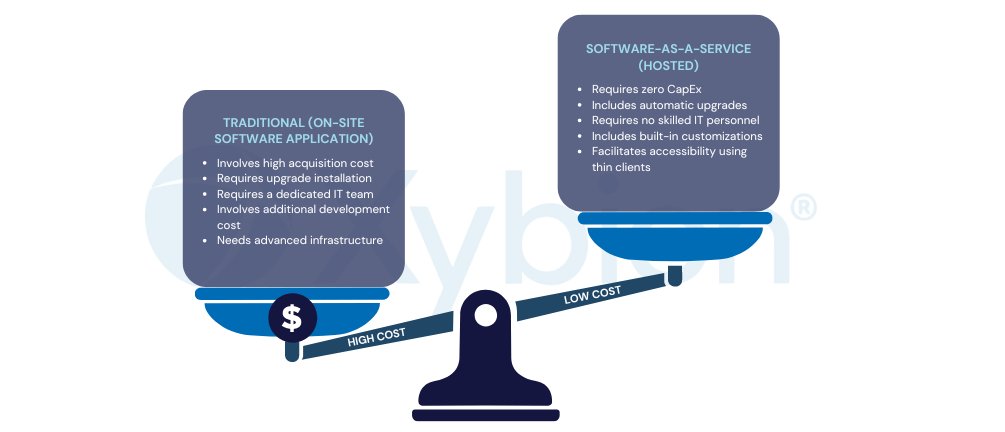
Laboratories across diverse industries leverage LIMS to optimize operations, ensure compliance, and boost efficiency. In biobanking, LIMS manages the intricate logistics of sample storage and retrieval, safeguarding the integrity of biological specimens. Contract laboratories benefit from LIMS by efficiently handling large volumes of client data, ensuring accurate and timely reporting.
Environmental and water testing laboratories use LIMS to monitor pollution levels and ensure water safety, highlighting the system’s critical role in public health protection. In the food and beverage industry, LIMS supports stringent quality control processes, from tracking ingredient sources to final product testing, thereby ensuring consumer safety and regulatory compliance. Similarly, in manufacturing, materials, and mining industries, LIMS is instrumental in maintaining quality assurance, ensuring products meet rigorous industry standards.
In the medical and healthcare sectors, LIMS is essential for managing patient data, diagnostic results, and research information, demonstrating its ability to handle sensitive and complex data with precision. In medical device production, LIMS ensures compliance with regulatory standards, while in nuclear and radiochemical laboratories, it manages intricate data processes and safety protocols.
Pathology labs, petrochemical plants, pharmaceutical companies, and veterinary clinics also benefit from LIMS, which adapts to the specific needs of each discipline. Whether tracking complex workflows, managing regulatory compliance, or ensuring data integrity and traceability, LIMS provides tailored solutions that enhance laboratory operations.
The widespread adoption of LIMS across various industries underscores its critical role not only in laboratory management but also in driving scientific and technological advancements. By automating workflows, standardizing processes, and ensuring robust data integrity, LIMS is critical to the operational success and innovation capabilities of laboratories worldwide.
Selecting the right LIMS for your laboratory requires careful consideration of your lab’s size, industry, and specific needs. For smaller labs, an ideal solution would offer scalability without significant upfront investment. Larger laboratories may need a LIMS with extensive customization options and advanced data analytics capabilities. It’s essential to choose a LIMS that can grow and adapt with your laboratory’s evolving requirements.
Different industries have unique LIMS requirements; for example, a pharmaceutical lab will have distinct regulatory needs compared to a quality control lab. Understanding your industry’s specific challenges will guide you in selecting a LIMS that aligns with your operational demands. Key features to look for include workflow automation, efficient sample tracking, and robust data storage, all tailored to support your lab’s processes.
Implementing a LIMS can greatly enhance data management by replacing traditional lab notebooks with an electronic system, streamlining sample handling, and providing real-time data access. Additional features like automatic reorder alerts and instrument calibration schedules can further optimize lab operations, making them important factors in your selection process.
Also, consider the level of support and training the LIMS provider offers. A LIMS provider like Xybion, which emphasizes comprehensive support and training, can facilitate a smooth transition and maintain operational efficiency. Assessing the provider’s track record with similar laboratories can offer valuable insights into the system’s suitability for your needs. Matrix Gemini LIMS, for example, is a versatile all-in-one solution that can be scaled and configured to meet the specific requirements of labs of any size.
A Laboratory Information Management System (LIMS) plays a crucial role in enhancing operational efficiency, ensuring data integrity, and streamlining management processes in laboratories. The shift to cloud-based LIMS solutions represents a significant evolution in laboratory data management, offering scalability, improved collaboration, and robust audit trails.
Matrix Gemini LIMS is a comprehensive solution designed to address the complex needs of modern laboratories across various industries. By standardizing operations, automating workflows, and ensuring compliance, Matrix Gemini LIMS helps laboratories achieve their objectives with greater efficiency and reliability.
Understanding the vital functions of a LIMS in tracking, managing, and analyzing laboratory data is key to selecting the right system. Matrix Gemini LIMS meets these requirements, making it an ideal choice for laboratories aiming to enhance their operational efficiency and data management. To discover how Matrix Gemini LIMS can be configured to your specific needs, consider scheduling a demo today.
We use cookies to improve your experience. By continuing to use our site, you accept our use of cookies. Privacy Policy and Terms of Use.
Cookie SettingsAccept